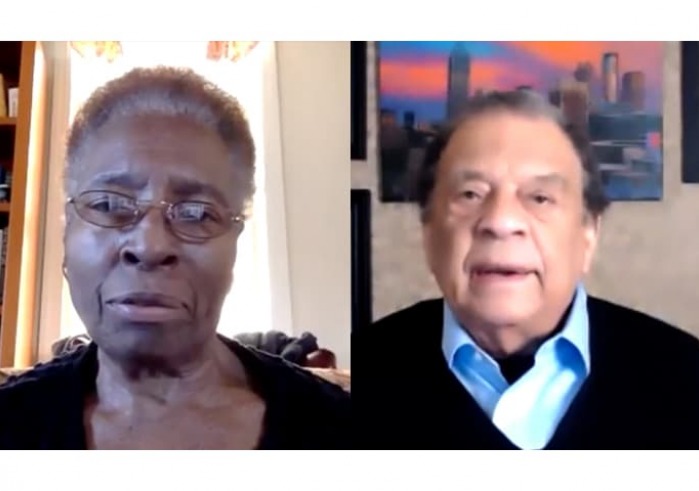Andrew Young and Hortense Spillers Speak to Universities’ Role in Building on MLK’s Legacy

About three hundred friends and members of the Soka community came together virtually on January 22 for “Honoring Martin Luther King Jr.—A Conversation,” the first event co-sponsored by SUA’s newly established Center for Race, Ethnicity, and Human Rights and its Office of Diversity, Equity, and Inclusion.
Held in commemoration of Martin Luther King Jr. Day, the webinar featured two esteemed panelists: Ambassador Andrew J. Young, civil rights activist, former congressman from Georgia and ambassador to the United Nations, and confidant to Martin Luther King Jr.; and Dr. Hortense J. Spillers, American literary critic, Black feminist scholar, and Gertrude Conaway Vanderbilt Professor at Vanderbilt University, who also currently serves as the Distinguished Visiting Faculty Fellow for the REHR Center.
The panelists shared anecdotes and advice on how Dr. King’s philosophy of nonviolence can be implemented today, especially at the university level, to address racism and division in the US and world.
“I think Dr. King would be very, very proud of the sensitivity of Black and white. He would be proud that people as far as New Zealand and Africa were mobilized by George Floyd’s death,” Ambassador Young said in his opening remarks, referring to how much faster mobilization is now compared to during the civil rights movement. “I think he would also, though, be concerned that it’s not disciplined enough, that we were very careful to keep a purely nonviolent demonstration, [which] is far more powerful than either a violent demonstration or a demonstration that is tainted with episodes of violence.”
Dr. Spillers echoed those thoughts and called for a conscious approach to change. “I think that the challenge before all of us—and I’m saying that because I feel no particular wisdom or superiority in age to young people in society today—what we’re up against now is what the world was still confronting when Martin Luther King started his movement,” Dr. Spillers said. “And that is a mandate to be conscious, the mandate to be aware.”
Both speakers noted that when confronting these challenges, learning from global, historical examples is paramount. Ultimately, nonviolence is a way of life rather than a tactic, and requires individual discipline as evidenced by the philosophy of satyagraha advocated by Mohandas K. Gandhi and adopted by Dr. King.
“For instance, if you think of the ways that racism works, it really is a projection, right?” Dr. Spillers continued. “It’s a projection outward of something that one does not accept in oneself so that if you project it outward onto somebody else, or onto another group of people, you can live with yourself. Don’t do it. It’s an evacuation. Self-hatred is really an evacuation.”
By contrast, through practicing self-love and self-discipline, we can extend acceptance outwards, Dr. Spillers explained.
A key takeaway of the discussion that both speakers alluded to was that the university is an apt training ground to develop such love and discipline.
“Naturally, Martin Luther King Jr., his legacy and his work are so aligned with everything SUA stands for and in particular what SUA’s founder stands for and expects of the global citizens SUA aims to foster,” said Maya Gunaseharan, Soka’s manager for diversity initiatives and community building, who was one of the event’s moderators.
“The question that came up around the role of the university in achieving social justice, which Dr. Spillers responded to from the perspective of faculty who serve students and Ambassador Young responded to in terms of what students can do every day—it’s only just the beginning.”
“Dealing with racism and learning to love means learning to appreciate differences,” Ambassador Young said, placing particular emphasis on university campuses being the place to begin to do this. “I think everybody on this planet is lonely. In fact, one of the biggest worries I have about present-day education is that…students don’t speak to each other.”
He encouraged SUA students to make it a point to say hello to everyone they meet. “Make that a ritual, if you want to do something to make me and Martin Luther King happy. Every time you go into the classroom, say good morning or good afternoon to whoever the teacher is and then whoever you sit next to, if you don’t know their name, say hi… that’s the beginning of community.”
“I think the university is responsible—and this might not even be fair—but I think that the university is always responsible for whatever state society is in,” Dr. Spillers said. “I don’t think of the university as an ivory tower at all. I think that if you look at a society and the different relations that grow out of a society, find out what’s going on in the universities, because it’s out of our colleges and universities that everything else concerning public education or the education of a populace…comes.”
Said Ambassador Young: “From what I have learned from you about Soka, that you have the world on your campus, that you probably have more people from more nations than are present in the United Nations at any one time, you have an extremely valuable opportunity to get to know the world.”
The discussion was co-facilitated by Gunaseharan, Kevin Moncrief, Soka’s vice president for Mission Integration, and Ian Reed, co-director, with Moncrief, of the REHR Center.
The purpose of the event, which is the first of many that the center hopes to host regularly, was to open an ongoing discussion and inquiry into how to implement Soka’s ideals by learning from the examples of prominent human rights leaders.
A recording of the event can be viewed on the center’s website.
